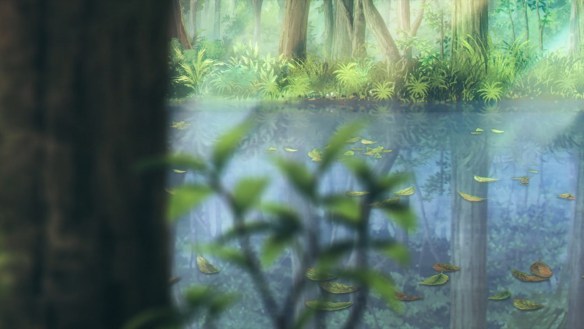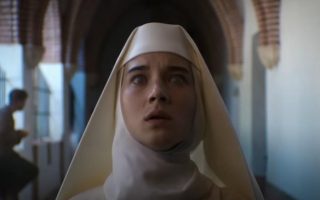Hello folks, and welcome back to Wrong Every Time. Today we reach the grand finale of Frieren’s confrontation with Aura the Guillotine, as the woman whose bloody history earned her the title “Slayer” confronts one of the proud remnants of the Demon King’s army. This has been a fraught and ambiguous arc for Frieren both in a dramatic and conceptual sense; the distrust these characters have felt towards Frieren judgment has been matched by my own distrust of the author’s judgment, in theoretically making the theme of this arc “some people are born evil and the only thing for it is to butcher them.” That’s a bad theme and a boring narrative, but the evidence we’ve seen points towards a slippier, more interesting truth: demons are just as emotional and full of diverse passions as humans, but their conception of value and society may be inherently incompatible with our own.
Demons are “animalistic” in the fact that they value strength above all else, and are ruthless in their pursuit of such strength – but then again, does that make them any different from a great number of humans? And aside from that, they exhibit pride, scorn, loyalty, playfulness, and a gamut of other emotions, often seeming more animated by their passions than the blank-faced Frieren and Fern. It was in fact Aura’s offhand mockery of Himmel, the man who first introduced Frieren to love and loss, that convinced her Aura is beyond understanding – an entirely personal judgment, and one emphasizing how little distance exists between Frieren and Aura’s perspectives. If war is inevitable, so be it, but I am happy to leave this arc more uncertain of Frieren’s judgment, and more attuned to the ruthless moral ambiguity of this world.
Episode 10
We open with a flashback to Frieren and Flamme, a perfect opportunity for this production to show off its marvelous control of atmosphere. We are carried into this forest through incidental details – the shimmer of light between the trees, the crunch of leaves beneath their feet, reflections on the pond beside them and the trilling of birds in the trees. Every episode of this show makes me all the more excited to watch Keichiro Saito’s career unfold
Flamme proves herself the source for Frieren’s perspective on demons, stating bluntly that “they’re nothing more than monsters capable of speech”
“They don’t play fair, so we must be even more unfair.” Basically a word-for-word justification for dehumanization across history. I’m still not sure this is the intended read (just sticking with my general policy of “assume purpose until proven otherwise”), but there is certainly some fascinating potential here for interrogating Frieren’s idolizing of memory – “cherishing the past” is all well and good, but what if the figures you cherished actually steered you wrong?
Meanwhile, in the present time, Lugner’s missing his whole dang torso
Lugner consoles himself with his certainty that Aura will defeat Frieren. Fern says Frieren would never confront a demon directly, while Lugner reflects that Frieren has always done so – so has Frieren changed so substantially, or is it simply that Fern has never experienced this side of Frieren?
“This girl’s mana is weak, and yet I was overwhelmed by the sheer number of her rapid attacks.” Yamada’s heart doesn’t really seem to be in this magical tactics stuff, and I frankly think that’s for the best, given this story’s actual strengths. We’re not writing Hunter x Hunter here; this is a reflection on future opportunities and past regrets, not a board game transposed to visual drama
“What you’ve done isn’t fair. You’re a disgrace to all mages.” I love Lugner’s pride in mastering magic the “right” way. He’s basically like any proud yet brittle competitor bickering about “cheap moves,” and it’s a very human quality
We cut back to Flamme standing before Basalt the Throne, another demon king general
Ah, this is when she met Frieren. Their bond was forged in the context of the atrocities committed by the demon army, a context that would presumably color all that came afterwards
“Why do people always engage their enemies directly? Run, hide, take your enemies by surprise… there are plenty of other options.” Interestingly, it was also Flamme who taught Frieren not to fight “fair,” to do whatever is necessary to achieve victory. She possesses none of Lugner’s ego regarding proper magical form, because she is not dueling to demonstrate her strength, she is fighting to win
And of course, it’s that same sort of cunning and trickery that Frieren said makes demons impossible to reason with. Her own master embodies the ruthlessness she sees as intrinsic to demonkind
“I was the strongest, but I still couldn’t protect them.” “If I was in your shoes, I wouldn’t have hesitated to run.” An interesting pair of lines. The first demonstrates Frieren’s disillusionment with pure strength – a precedent for the brutal efficiency she would eventually develop, a power based more in her unwavering mindset than magical abilities. The second emphasizes Flamme’s total disinterest in moral calculus, a coldness she would ultimately cultivate in Frieren as well. If Frieren is a monster, it’s clear Flamme played a key role in sculpting her so
“The moment they realized we were mages, they stepped out into the open.” Demons’ conception of value and honor again – those without magic do not deserve accommodation, but the training of a mage must be respected
Flamme describes this as a “ridiculous sense of pride,” treating it as a personal failing rather than a collective value system. Of course she, who runs from any conflict she is not certain of winning, cannot see honor in the alternative
“Though they were exceptional mages, they lost because of their overconfidence.” A very Flamme interpretation of her victory. She fails to understand two things: first, that her opponents would never consider employing the “dishonorable” method of concealing their mana, and second, that defeat in open combat would actually be preferable to abandoning their values in order to achieve victory. “Death before dishonor” is a statement entirely foreign to Flamme’s philosophy
And yet even Flamme describes her style as “cowardly.” Kanehito Yamada definitely has some issues with character voice – everyone in this story shares too much of a mindset and too much of an affectation, with almost everyone sticking to this blunt, low-energy speaking style
“Demons took everything from me. I hate them so much that I wish I could exterminate every last one.” Frieren’s deadpan words demonstrate she’s far from a neutral party in this conflict
“Only you and I should become cowards who make a mockery of magic.” So does Flamme actually have some pride herself, but is simply willing to set it aside in order to pursue her higher goal of killing all demons? And then that attitude filtered down to Frieren without the shame, and Frieren has now taught it to Fern without even mentioning how it might be considered “cowardly”
The main trick is learning to suppress your magical output forever, so no demon can ever effectively gauge your power
Thus we return to the present day, with the combination of Aura’s pride, Frieren’s cowardice, and the Scales of Obedience perfectly aligned for Frieren’s victory
Flamme’s explanation for demons not concealing their mana is simple: mana is status in their society, and thus permanently concealing your mana would mean abandoning your honor, rank, and pride
“The world of demons is cruel. They’d never grant any dignity to those with little mana.” Her words are complimented by the camera panning over beggars languishing in this human city, emphasizing the moral parallels between our societies
“Just as humans are bound by status and wealth, so are demons bound by mana.” Flamme intentionally framing herself and Frieren as beings apart from either society
These memories of Flamme are making it easy to understand why Frieren was still so oblivious to her own emotions when she journeyed with Himmel – Flamme taught her only about efficiency in destruction, and nothing about being a person. It seems Flamme herself doesn’t know how to be a person, or at least one who embraces personal relationships with others
We cut to fifty years later. “Frieren, do you still love magic?” “Somewhat, I suppose.” The years have not been kind to her sense of wonder
“In the end, all I could do was teach you how to fight.” Near the end of her life, Flamme realizes how little of the world she actually shared with Frieren
Her final request is quite unlike her, or at least unlike the self she presented to Frieren – to plant flowers around her grave. In spite of her cold affectation, it was the flower spell her parents taught her that sticks in her mind
Beautiful long shots convey Frieren’s isolation following Flamme’s death
In an overarching anime landscape that has largely abandoned strong layouts in favor of easily reproducible CG backdrops, it’s incredibly heartening to see how dedicated this production is to consistent, diverse compositions, each with their own painted backdrops
As ever, Frieren’s life is presented in montage, while a small village grows into a vast castle town. Her life is defined by vast empty spaces
“I’ve lived a long time, but I haven’t done much with my life.” Even Frieren can recognize the emptiness in her story
Another excellent use of montage following her first meeting with Himmel – though that encounter sticks clearly, their entire passage to the demon king passes as a momentary blur
“You’ve barely changed since eighty years ago. Were you working on other skills, or simply wasting your life away?” Aura’s words serve as a graceful capstone for Frieren’s journey – though Frieren has indeed gotten stronger over this time, she has also learned that a heedless pursuit of strength above all else leads to an impoverished existence, the narrowest possible slice of what life truly has to offer. If there’s anything making Aura “inhuman,” it is her pursuit of strength at the expense of all other potential experiences – a pursuit that Frieren herself is only just now learning to question
“Honestly, I would have been in trouble if you tried to overwhelm me with numbers. I’m glad you’re so confident in your own mana.” Good or evil, Aura’s pride was her downfall
And Done
Whew, that was a fascinating episode! Getting a full portrait of Frieren’s time with Flamme went a long way towards explaining her philosophy, both towards life in general and towards demons in particular. Flamme essentially taught her to be a weapon, to see nothing in demons but weaknesses to exploit, and to dedicate her life to making herself both more dangerous and more concealed as a threat. Only near the end of her life did Flamme realize she’d sculpted Frieren into a vessel little different from the demons she despised – but by then, it was too late to offer her anything but her parents’ flower spell. Rather than lean into the binary morality initially proposed, this episode was largely dedicated to showing all the ways Frieren herself is similar to demons, and in a way even less committed to either individuality or community than their proud society. A satisfyingly ambiguous conclusion to this messy tale.
This article was made possible by reader support. Thank you all for all that you do.




